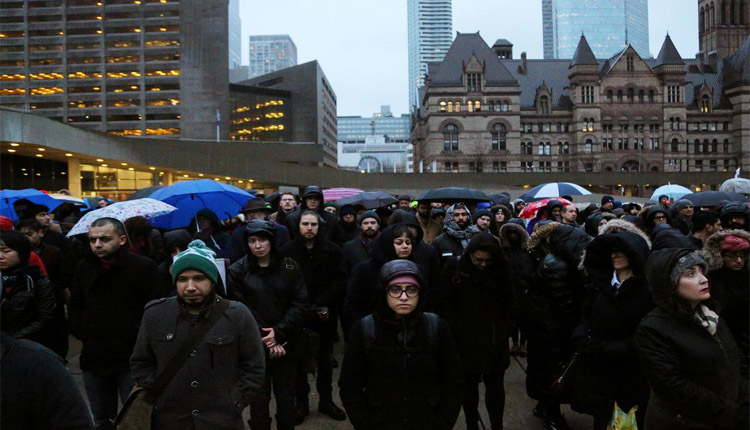Leaders and organizations around the world expressed disgust and sorrow at the killing of 49 people in shootings at two New Zealand mosques on Friday, attacks that many blamed on the demonization of Muslims by the West
Western leaders from Donald Trump to Angela Merkel expressed solidarity with New Zealanders, deploring what the White House called a “vicious act of hate”.
The response from some Muslim countries went further, blaming politicians and the media for stoking that hatred. The nationalities of the victims included Indian, Pakistani, Malaysian, Indonesian, Egyptian, Bangladeshi, Saudi, Somalian and Turkish, authorities said.
New Zealand police said 49 people were killed and 42 were being treated for wounds, including a four-year-old child. Three people were in custody including one man who has been charged with murder, police said.
“I blame these increasing terror attacks on the current Islamophobia post-9/11 (where) 1.3 billion Muslims have collectively been blamed for any act of terror,” Pakistani Prime Minister Imran Khan wrote on social media.
Turkish Foreign Minister Mevlut Cavusoglu said the attack was a result of Muslims being demonized. “Not only the perpetrators, but also politicians & media that fuel the already escalated Islamophobia and hate in the West are equally responsible for this heinous attack,” he tweeted.
United Nations Secretary-General Antonio Guterres reiterated “the urgency of working better together globally to counter Islamophobia and eliminate intolerance and violent extremism in all its forms,” a spokesman said.
Hundreds of protesters in the Bangladeshi capital, Dhaka, chanted “Allahu akbar!” (God is Greatest) after Friday prayers.
“We will not let the blood of Muslims go in vain,” said one protester. Members of the Bangladesh national cricket team, in Christchurch for a match against New Zealand, arrived for Friday prayers as the shooting started but were not hurt.
New Zealand Prime Minister Jacinda Ardern said some of the victims may have been new immigrants or refugees.
“They are us,” she said. “The person who has perpetuated this violence against us is not. They have no place in New Zealand.”
Trump, following a phone call with Ardern, said on Twitter: “…I informed the Prime Minister … that we stand in solidarity with New Zealand – and that any assistance the U.S.A. can give, we stand by ready to help. We love you New Zealand!”
The accused gunman’s manifesto posted online praised Trump as “a symbol of renewed white identity and common purpose”.
Asked by a reporter if he thought white nationalism is a rising threat around the world, Trump said: “I don’t really. I think it’s a small group of people that have very, very serious problems. I guess if you look at what happened in New Zealand perhaps that’s a case, I don’t know enough about it yet.”
Trump said he had not seen the gunman’s manifesto.
Australian Prime Minister Scott Morrison said an Australian national arrested after the attack was an “extremist, right-wing violent terrorist”.
Britain’s Queen Elizabeth, who is New Zealand’s head of state, said she was “deeply saddened by the appalling events”.
Pope Francis deplored the “senseless acts of violence”.
In a message of condolence sent by Vatican Secretary of State Cardinal Pietro Parolin, Francis “assures all New Zealanders, and in particular the Muslim community, of his heartfelt solidarity in the wake of these attacks”.
Iranian Foreign Minister Mohammad Javad Zarif called for an emergency meeting of the Organization of Islamic Cooperation, the world’s largest Muslim body, to discuss this “horrible crime”, Iran’s state news agency IRNA reported.
“Western hypocrisy of defending demonization of Muslims as ‘freedom of expression’ MUST end,” Zarif said on Twitter. He posted a picture of U.S. President Donald Trump saying “I think Islam hates us,” during the 2016 U.S. election campaign.
The Palestinian chief peace negotiator, Saeb Erekat, called the attack a “consequence of racist ideologies that continue trying to promote religious wars”.
He compared it to the shooting last October at a synagogue in the U.S. city of Pittsburgh that killed 11 people, deadly attacks on churches in Egypt by Islamic State and an attack by a far-right Israeli gunman on a West Bank mosque in 1994 that killed 29 people.
A statement by Lebanon’s Iran-backed Hezbollah, which has been accused by the United States of terrorism, said in part: “Hezbollah warns against the tendency of extremism against Muslims and foreigners and against the politics of hate that the United States nourishes in the world, rather than religious values that advocate tolerance, dialogue and acceptance of the other.”
German Chancellor Merkel mourned “with the New Zealanders for their fellow citizens who were attacked and murdered out of racist hatred while peacefully praying in their mosques”. Her foreign minister, Heiko Maas, said: “When people are murdered solely because of their religion, this is an attack on us all.”
Sadiq Khan, the first Muslim mayor of London, said Londoners stood shoulder to shoulder with the people of Christchurch. He also pointed his finger at those who promote religious hatred:
“When the flames of hatred are fanned, when people are demonized because of their faith, when people’s fears are played on rather than addressed, the consequences are deadly, as we have seen so sadly today,” he said.
Norwegian Prime Minister Erna Solberg said the attack brought back memories of the 2011 attack by anti-Muslim extremist Anders Breivik that killed 77 people: “It shows that extremism is nurtured and that it lives in many places.”
Al-Azhar University, Egypt’s 1,000-year-old seat of Sunni Islamic learning, called the attack “a dangerous indicator of the dire consequences of escalating hate speech, xenophobia and the spread of Islamophobia”.
source: Reuters


